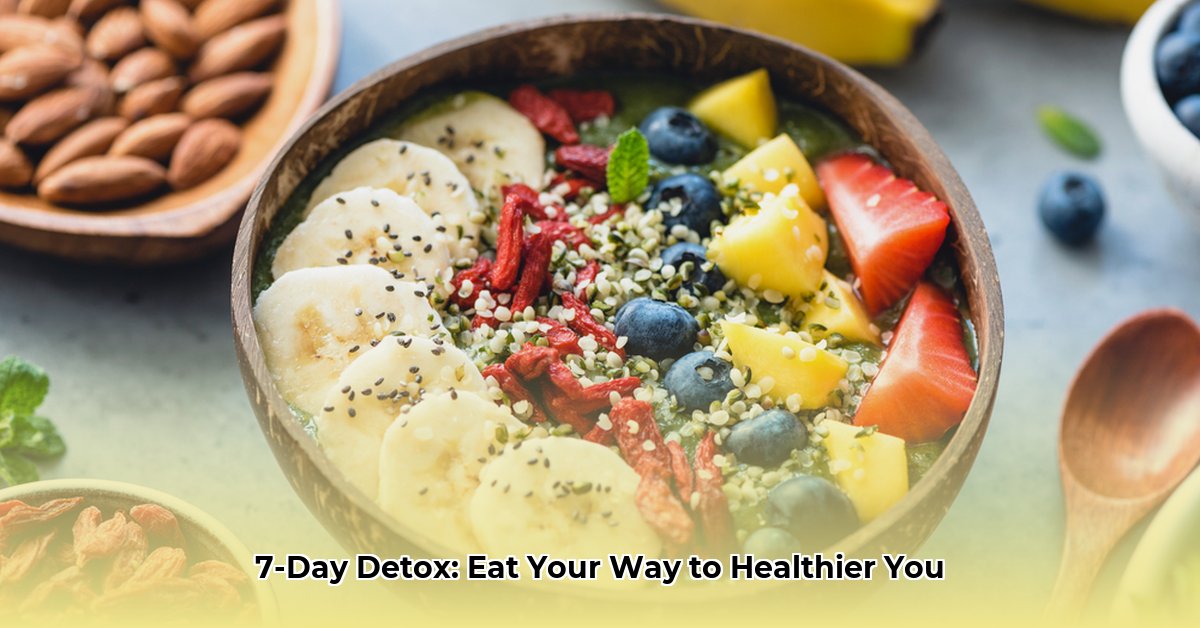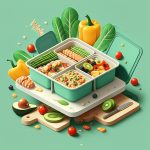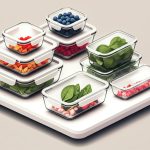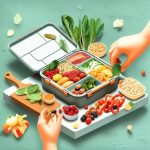Worried about heavy metals in your body? Feeling sluggish or experiencing unexplained health issues? You’re not alone. This comprehensive guide explains how specific foods can support your body’s natural detoxification processes, helping you eliminate those unwanted heavy metals. Learn about the science, discover powerful detoxifying foods, and implement a simple dietary plan. It’s not a miracle cure, but a sustainable approach to feeling healthier and more energized. For a sample 7-day plan, check out this helpful guide.
Understanding the Role of Diet in Heavy Metal Detoxification
Let’s clarify a common misconception: you can’t simply “eat away” heavy metals. However, strategic food choices can significantly enhance your body’s inherent ability to detoxify. This isn’t about a quick fix; it’s about adopting a long-term dietary approach to support overall wellness. What exactly do the liver and kidneys do in this process?
The Body’s Detoxification Powerhouse: Liver and Kidney Function
Your liver and kidneys are the primary organs responsible for filtering toxins, including heavy metals, from your body. Constant exposure to environmental pollutants, certain foods, and even some personal care products can overwhelm these organs. A well-planned diet provides essential nutrients that boost liver and kidney function, optimizing their ability to remove toxins.
A Week of Detox Support: A Gentle 7-Day Dietary Approach
This isn’t a radical cleanse, but a supportive plan to optimize your body’s detoxification pathways. The aim is to nurture your body’s natural ability to eliminate toxins, not to promise overnight results. Consider it a gentle reset for your system.
Your 7-Day Plan (Consistency is key; dramatic changes take time):
Days 1-7: Prioritize incorporating these nutrient-rich foods into your daily meals. Portion control is important. Avoid overeating any single food; moderation is essential.
- Cilantro: This herb contains compounds that may bind to heavy metals, facilitating their elimination. Add it generously to salads, soups, and guacamole.
- Blueberries: Packed with antioxidants, blueberries combat oxidative stress associated with heavy metal exposure. Enjoy a handful as a snack or add them to smoothies and oatmeal.
- Spirulina & Chlorella: These algae are nutritional powerhouses, boasting nutrients that bolster detoxification pathways. Blend them into smoothies or take them as supplements.
- Garlic: Sulfur compounds in garlic may stimulate detoxification processes. Sauté a clove and add it to pasta or stir-fries.
- Beets: These root vegetables possess cleansing properties. Roast them, juice them, or add them to salads for a vibrant and nutritious boost.
- Artichokes: Rich in antioxidants, artichokes may support healthy liver function. Steam them, grill them, or add them to dips and salads.
- Turmeric & Ginger: The potent anti-inflammatory and antioxidant properties of these spices may help reduce inflammation often linked to metal exposure. Use them liberally in curries, soups, and teas.
Important Note: This dietary plan supports your body’s detoxification processes, not a substitute for medical treatment. If you suspect heavy metal toxicity, consult a healthcare professional for testing and appropriate interventions.
Beyond 7 Days: Embracing a Detox-Supporting Lifestyle
Think of this week as a starting point. Consistent incorporation of these foods, alongside other healthy habits, creates a foundation for long-term well-being.
- Hydration: Water is vital for flushing out toxins. Drink plenty of water throughout the day.
- Fiber-Rich Diet: Fiber aids the digestive system in removing waste products, including heavy metals. Consume plenty of fruits, vegetables, and whole grains.
- Balanced Diet: A balanced diet with fruits, vegetables, whole grains, and lean protein fuels your body and supports natural detoxification.
Understanding the Nuances of Heavy Metal Detoxification
While these foods offer potential benefits, it’s crucial to acknowledge the limitations of current research:
- Evolving Science: More research is needed to fully understand the effects of these foods on heavy metal detoxification in humans.
- Individual Variability: Responses to these foods can vary due to genetics, gut health, and the specific metals involved.
- Supportive Role: These foods are supportive, not a guaranteed solution for removing all heavy metals.
This is a journey towards better health through informed dietary choices. Consult with healthcare professionals for personalized advice, especially if you have concerns about heavy metal exposure.
Optimizing Heavy Metal Detoxification: Dietary Strategies and Targeted Foods
Key Takeaways:
- Foods can play a role in supporting the body’s natural detoxification of heavy metals.
- A well-rounded diet can minimize heavy metal accumulation.
- Consistency is key.
- Personalized guidance is important.
- This is not a quick fix but a long-term commitment to optimal health.
Understanding Heavy Metal Buildup and Its Effects
Heavy metals, such as mercury, lead, and cadmium, can accumulate in the body and disrupt cellular function. The liver and kidneys, the body’s primary detoxification organs, can become overburdened. What dietary strategies can support these organs and promote heavy metal detoxification?
Dietary Strategies for Natural Heavy Metal Cleansing
Supporting your body’s natural cleansing processes is key. These foods enhance your body’s ability to handle heavy metals effectively. Incorporating healthy dietary strategies can improve your chances of reducing the impact of heavy metals on your health.
- Boosting Fiber Intake: Fiber binds to heavy metals in the digestive tract, facilitating their excretion. Increase your consumption of fruits, vegetables, and whole grains.
- Prioritizing Antioxidants: Antioxidants combat oxidative stress, a consequence of heavy metal toxicity. Consume berries, leafy greens, and cruciferous vegetables.
- Maintaining Hydration: Adequate hydration is crucial for flushing out toxins through urination. Aim for at least eight glasses of water daily.
- Incorporating Cilantro and Chlorella: While more research is necessary, some studies suggest that these foods may aid in heavy metal chelation.
Foods to Enhance Detoxification
Here’s a table of foods often associated with supporting heavy metal detoxification:
| Food | Benefit | Serving Suggestion |
|---|---|---|
| Leafy Greens | Rich in antioxidants and fiber | Add to salads, smoothies, or sautéed dishes |
| Cruciferous Vegetables (Broccoli, Cabbage) | Support liver function | Roast, steam, or add to soups and stir-fries |
| Berries | Rich in antioxidants | Snack, topping for yogurt or cereal |
| Garlic | Sulfur compounds may aid detoxification | Seasoning for savory dishes or garlic paste |
| Legumes | Source of fiber | Ingredient in soups, stews, or salads |
Considerations and Expert Advice
- Consult a Healthcare Professional: Consult a healthcare provider or registered dietitian before making significant dietary changes, especially if you have existing health conditions.
- Gradual Changes: Introduce dietary changes gradually to allow your body to adapt.
- Commitment to Long-Term Health: Detoxification is a process that requires a long-term commitment.
- Setting Realistic Expectations: While these foods support detoxification, they don’t guarantee complete removal of heavy metals.
[1https://www.healthline.com/health/heavy-metal-detox]
Strategic Detoxification Approaches for Specific Populations
There is no single approach to ridding the body of heavy metals. However, you can support your body with lifestyle choices and targeted foods. This focuses on aiding, rather than claiming to magically eliminate heavy metals.
Key Takeaways:
- Minimizing exposure is key.
- Targeted nutrients support detoxification.
- Personalized approaches are essential.
- Dietary changes alone may not be enough.
Heavy Metal Buildup: Understanding Varying Effects
Heavy metals accumulate through contaminated food and water, industrial pollution, and personal care products, negatively impacting organs and systems. These effects vary based on individual sensitivity, necessitating tailored approaches.
Reducing Exposure: Prioritizing Prevention
Minimize exposure as the most effective long-term strategy:
- Water Filtration: Use quality filters to remove contaminants.
- Dietary Choices: Choose organic produce and low-mercury fish and limit rice.
- Household Products: Use non-toxic cleaning supplies and personal care items.
These steps can significantly reduce heavy metal intake.
Nutritional Strategies: Supporting Natural Detoxification
Support natural detoxification through:
- Antioxidants: Combat oxidative stress with blueberries, spinach, and artichoke hearts.
- Sulfur-Rich Foods: Consume cruciferous vegetables and garlic.
- Fiber: Increase intake through fruits, vegetables, and whole grains.
- Specific Nutrients: Consult your doctor before adding supplements. Selenium and zinc (minerals) may play a supporting role.
Lifestyle Factors: Enhancing Natural Processes
- Regular Exercise: Sweating aids toxin elimination.
- Sauna Use: Regular sessions may promote detoxification; consult your physician, especially if you have heart conditions.
- Adequate Sleep: Prioritize sufficient sleep for the body’s repair processes.
Remember, these measures are supportive, not standalone treatments.
Seeking Medical Guidance: When to Consult a Doctor
Consult a doctor for significant exposure or concerning symptoms like fatigue, neurological issues, or unexplained illness. Chelation therapy, a medically supervised procedure, may be recommended under strict medical guidance.
Dietary Strategies for Reducing Heavy Metal Bioaccumulation in Children
Key Takeaways:
- Ultra-processed foods link to increased heavy metal exposure.
- Deficiencies worsen heavy metal accumulation.
- Prioritize reducing ultra-processed food intake and increasing nutrient-rich options.
- Supplementation may be beneficial under professional guidance.
- More research is beneficial.
The Connection Between Ultra-Processed Foods and Heavy Metals
Ultra-processed foods lack essential nutrients and can contain heavy metals, impacting children’s growth and development.
The Role of Micronutrients
Zinc and selenium help the body fight off heavy metals. Calcium can inhibit heavy metal absorption.
Dietary Strategies: Practical Steps for Parents
- Minimize Ultra-Processed Foods: Limit sugary drinks, packaged snacks, and fast food.
- Boost Nutrient-Rich Foods: Add fruits, vegetables, whole grains, and lean proteins.
- Prioritize Zinc and Selenium: Add zinc-rich foods and selenium-rich foods.
- Consider Supplementation (with guidance): A doctor or registered dietitian can assess your child’s needs.
- Clean Eating Practices: Wash all produce thoroughly.
Long-Term Strategies and Ongoing Research
More research is required. These changes will reduce exposure and contribute to better health.
- Stainless Steel Food Storage for Healthier, Eco-Friendly Meal Prep - February 27, 2026
- Stainless Food Containers Offer Durable Storage for Everyday Meals - February 26, 2026
- Stainless Steel Containers Offer Superior Food Preservation and Durability - February 25, 2026










